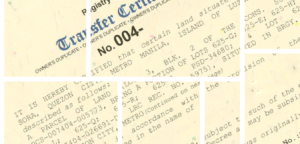In a landmark decision involving the case of Spouses Orencio S. Manalese, Eloisa B. Manalese, and Aries B. Manalese against the Estate of the Late Spouses Narciso and Ofelia Ferreras, the Supreme Court of the Philippines has underscored the crucial need for prospective land buyers to conduct thorough due diligence before purchasing property. The case serves as a cautionary tale about relying solely on a certificate of title, especially in transactions tainted with potential signs of fraud or irregularities.
The dispute centered around two parcels of land in Angeles City, previously owned by the Ferreras couple. Following the passing of Narciso Ferreras in 2005 and Ofelia Ferreras in 1992, the properties became part of their estate, managed by Danilo Ferreras. Meanwhile, Carina Pinpin fraudulently acquired titles in her name by misrepresenting the deceased Ferreras as sellers in a deed of absolute sale. This deception laid the groundwork for subsequent sales to the Manaleses, who later claimed they were innocent purchasers for value.
The Supreme Court highlighted the following key points from the case:
The Court ruled that the Manaleses could not claim good faith because they failed to investigate the suspicious circumstances surrounding the ownership of the properties. The sale from Pinpin to the Manaleses came just a year after Pinpin’s own fraudulent acquisition of the titles, raising red flags.
The Court emphasized the importance of thorough due diligence, which includes scrutinizing both the certificate of title and the registry of deeds. Ignoring inquiries that could reveal irregularities led to the Manaleses being deemed buyers in bad faith, despite their assertions of innocence.
The Court reinforced the legal principle of caveat emptor (“let the buyer beware”), stressing that buyers are responsible for conducting adequate inquiries regarding the property before making purchases.
This ruling propels an essential message for all land buyers: relying solely on a certificate of title is inadequate. Prospective purchasers must diligently check the records at the Registry of Deeds to avoid potential pitfalls associated with fraudulent transactions.
Buyers should pay close attention to any annotations on the title and be aware of any recent transactions that appear suspicious. A title lacking encumbrances on its face may still hide dubious transactions in its history.
Even minor irregularities can indicate underlying issues. For instance, drastic discrepancies between purchase prices or the timing of transactions can serve as warnings to conduct further inquiries.
Engaging legal counsel or a land acquisition expert can provide insights into any complex issues surrounding a property title, ensuring that buyers make informed decisions.
The Supreme Court’s ruling is a compelling reminder of the paramount importance of due diligence in property transactions. Buyers must not turn a blind eye to the records available in the Registry of Deeds, especially if they encounter suspicious circumstances surrounding a sale. The judgment underlines that the legal protections offered by the Torrens system can only apply when parties exercise the necessary precautions in obtaining property titles.
Before finalizing any land transaction, it remains critical for buyers to undertake a thorough examination of all relevant documentation and consult with professionals when necessary. Failing to do so may lead to disputes, loss of investment, or worse, the loss of the property altogether. In the ever-evolving landscape of real estate transactions, informed buyers are empowered buyers.




